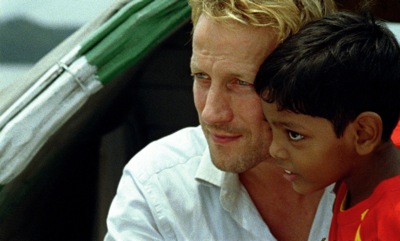At the bottom of the Oscar pool are the shorts categories. That’s not a dig at their quality, but at their obscurity. Many a ballot founders there. You’re doing fine with the actors, OK with the technical categories, then…wham!: three points lost as your last-ditch, what the hell are these things guesses sink your chance to win. Again.
I’ve been there. And I’m telling you it doesn’t have to be this way. Not if you can get yourself to one of the 200 theaters showing The Oscar Nominated Short Films 2012, the latest edition of a popular bundling of the titles by ShortsHD and Magnolia Pictures that began in 2005…which, not so coincidentally, is when members of my pool, who saw them, started triumphing in those categories. Seeing is believing, or, at least, being able to make better-educated guesses.
This year I have (mostly) seen them, and in brief (they are short films, after all) here are my findings, with synopses adapted from the official descriptions.
The Fantastic Flying Books of Mr. Morris Lessmore: “Inspired, in equal measures, by Hurricane Katrina, Buster Keaton, The Wizard of Oz, and a love for books, The Fantastic Flying Books of Mr. Morris Lessmore is a poignant, humorous allegory about the curative powers of story.”
Short take: Conveyed through some wonderful miniatures and 2D and computer animation, this sweet and funny Louisiana-made confection (a co-creation of noted children’s book author William Joyce) is pretty much a knockout.
La Luna: “A fable of a young boy who is coming of age in the most peculiar of circumstances. Tonight is the very first time his Papa and Grandpa are taking him to work. In an old wooden boat they row far out to sea, and with no land in sight, they stop and wait. A big surprise awaits the little boy as he discovers his family’s most unusual line of work.”
Short take: And the Pixar slot goes to Pixar…but in a year that sputtered with Cars 2 we get this wheel-spinner, well-made in the house style but mostly uninspired. Over the moon I wasn’t with this one. (I realize these categories are pro-am but the pros should be held to a high standard; a rote nomination, though to fair Pixar hasn’t won in this category since 2001’s For the Birds.)
A Morning Stroll: “When a New Yorker walks past a chicken on his morning stroll, we’re left to wonder which one is the real city slicker.”
Short take: I adored this comic gem, one with real “bite” to it, as you’ll see as the stroll takes an unusual direction. Expect the unexpected. (Winner, Best Animated Short, Sundance)
Sunday/Dimanche: “Every Sunday, it’s the same old routine! The train clatters through the village and almost shakes the pictures off the wall. In the church, Dad dreams about his toolbox. And of course later Grandma will get a visit and the animals will meet their fate.”
Short take: I got antsy with this one, which hails from the National Film Board of Canada, about five minutes in, or halfway through. Maybe it was the graphic style, or the way it was told; I couldn’t put my fidgety finger on it. It may have done its job of establishing a same old routine too well.
Wild Life (pictured): “Calgary, 1909: an Englishman moves to the Canadian frontier, but is singularly unsuited to it. His letters home are much sunnier than the reality. Intertitles compare his fate to that of a comet.”
Short take: This Canadian nominee is more like it. Those intertitles strain for metaphor but the visual storytelling and the dialogue (mostly voiceover, this is the only one of the five with significant talk) are assured, and the dramatic tone refreshing after the overall whimsy. Co-directors Amanda Forbis and Wendy Tilby have several nominations between them in this category.
My preference: The Fantastic Flying Books of Mr. Morris Lessmore
The winner: Expect Books, which references silents and MGM musicals, to be swept up in the nostalgia craze generated by The Artist and Hugo.
Pentecost: “When Damian is forced to serve as an altar boy at an important mass in his local parish, he faces a difficult choice: conform to the status quo, or serve an extended ban from his life’s passion–football.”
Short take: I saw this a day or two ago and already I’m having trouble placing it. There’s a funny moment at the beginning with Damian bungling a mass, then, a blur. Easy to take, not so easy to recall.
Raju (pictured): “Director Max Zaehle, together with his director of photography Sin Huh, and wonderful actors Wotan Wilke MÁ¶hring and Julia Richter, succeed at making the moral dilemma faced by couples wishing to adopt emotionally palpable.”
Short take: Well if you say so. But until a dip into familiar messages toward the end takes its toll this is a moving, if unremarkable, tale of a German couple’s adoption of a six-year-old boy from an orphanage in India, a process complicated by his disappearance and a revelation about his past.
The Shore: “After 25 years in exile, Jim Mahon (Ciaran Hinds) returns to Ireland to show his American daughter Patty (Kerry Condon) his Belfast roots. But things don’t go as planned when she learns of a secret love triangle and a long lost best friend, Paddy (Conleth Hill).”
Short take: With Terry George, the Oscar-nominated writer of In the Name of the Father and Hotel Rwanda, directing (with his daughter Oorlagh) a name cast this one has the pedigree. (George also recently directed Condon in HBO’s Luck.) This family story begins promisingly before trailing off into loose ends, and felt both overlong and undercooked at 31 minutes. (The total running time of all these shorts adds up.) It may be that George, trying his hand at softer, more impressionistic material, is better suited for the hard stuff of his screenplays.
Time Freak: “A neurotic inventor creates a time machine, only to get caught up travelling around yesterday.”
Short take: The sort of mildly funny jape, with an unsurprising surprise ending, that you expect to find on YouTube but not at the Oscars. A little late for Groundhog Day.
Tuba Atlantic: “Everybody is going to die one day. Oskar, 70, is going to die in six days. He is now ready to forgive his brother for a disagreement years ago. Will he reach his brother, who he believes live on the other side of the Atlantic Ocean, before it’s too late?”
Short take: Norwegians bring the funny, as only they can. So expect amusement on the dour side as the cranky Oskar, with the hindrance of a teenage social worker, finds an unusual means of communication with his sibling. I wouldn’t have been unhappy if he’d just picked up the phone.
My preference: George is the only prior nominee in this category, but I doubt the third time will be the charm for his listless effort. None of these films really moved me. But, obliged to pick, I’d say Raju.
The winner: Tough call. I’d say it’s between the slightly embraceable Raju and the slightly embraceable Tuba Atlantic, with the off-kilter Tuba Atlantic having a (slight) edge.
The Barber of Birmingham: “Mr. James Armstrong is a barber, a ‘foot soldier’ and a dreamer whose barbershop in Birmingham, Alabama has been a hub for haircuts and civil rights since 1955. ‘The dream’ of a promised land, where dignity and the right to vote belongs to everyone is documented in photos, headlines and clippings that cram every inch of wall space (and between the mirrors).”
Short take: It takes longer to read the remainder of the synopsis than it does to watch the movie, which was co-directed by Gail Dolgin, a nominee for the documentary feature Daughter from Danang (2002). But Armstrong, who died in 2009, more than capably spoke for himself, and enthralled customers–and us–with tales of his front-line struggles during the Civil Rights movement. The film culminates with Obama’s election, a moment of pride and reflection. It should be shown with The Help.
Incident in New Bagdad: “One of the most notorious incidents of the Iraq War–the July 2007 slayings of two Reuters journalists and a number of other unarmed civilians by US attack helicopters–is recounted in the powerful testimony of an American infantryman whose life was profoundly changed by his experiences on the scene.”
Short take: Two years later US Army Specialist Kent McCord, watching the Wikileaked footage of the incident at home on TV, formally turned against the war and hit the lecture circuit to discuss the attack (from which he rescued two children) and his and other soldiers’ struggles with post-traumatic stress disorder. Simple, direct, punch-in-the-gut filmmaking.
The Tsunami and the Cherry Tree (pictured): “Survivors in the areas hardest hit by Japan’s recent tsunami find the courage to revive and rebuild as cherry blossom season begins.”
Short take: The film begins with astonishing handheld video footage of the tsunami as it swept relentlessly inward, reaching right up to the photographer’s vantage point. It then returns to the same point some months later, where cleanup has only just begun. Cherry tree season imbues the survivors, some of whom lost everything, with a spirit of renewal. “Revive” is the advice of one. An inspiring tone poem, terrible and tranquil in equal measure.
My preference: The Tsunami and the Cherry Tree.
The winner: What, just three in this category? Well, no; HBO’s Saving Face, about a rash of acid attacks on women in Pakistan, and God is the Bigger Elvis, a portrait of Mother Dolores Hart, who in her past gave The King his first screen kiss in 1957’s Loving You, weren’t available for screening. I look forward to seeing that one on HBO in April, as the story of how Hart went from Where the Boys Are in 1960 to where the boys aren’t since 1963 is compelling.
It’ll take a miracle for it to win, though. This category favors high-fiber subject matter and heavy lifting, and subjects don’t come heavier (or more recent) than Tsunami, which benefits from graceful filmmaking. Co-director Lucy Walker, a nominee for last year’s excellent Waste Land, is one of several women directors in this category this year.
But, hey, don’t take my word for it. See for yourself. Some are already online and, according to the distributor, all will be on iTunes from Feb. 21 or available on Movies on Demand from various cable providers. The long and the short of it is that there’s no excuse not to compete in these categories come Oscar night on Feb. 26.








Comments